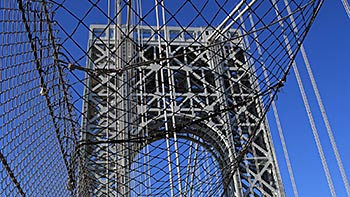 JOSEPHINE SLOYAN
JOSEPHINE SLOYAN
DON’T!
I was walking along the GW Bridge, looking for a place to jump off. The bridge was covered in heavy wire netting, and every so often there were signs with the suicide hotline number. Each sign was like seeing the shape of someone very far away, waving. A biker passed, then a couple, silent, hands thrust deep in their pockets. The sight of them filled me with a shivery flush, the precursor to becoming a spectacle.
Don’t, I thought. Don’t.
The thought went no further. If it did, it would start to reveal its depths, the immensity of what was submerged beneath it, and nothing would ever get done. Already I had made and discarded a handful of plans. Each failure to execute made my situation agonizingly clear and strengthened my resolve.
In the old days, for example, you just grabbed any old rope. I imagined there were more ropes in general, lying around—big, tough old ropes that lassoed bulls and hauled elevators up from gypsum mines. I mean to say that there was dignity. Hunched in my room, I scrolled through colors and lengths and eyelet-sizes like a homemaker searching up curtains. I compared ropes with five-hundred-pound capacities against those that bragged a thousand. I was not unaware of price point. What would you do? You’d shell out for neutral brown over the slightly cheaper hot pink. You’d pick the thousand, to be safe.
When the rope came in a five-pack, I fled the apartment and went for a walk through the neighborhood, boiling with neutered spite. Garbage spilled out of trash cans, formed sludgy pools in melted snow. Old men played dominoes, people chattered on their phones in something like birdsong. A man on the curb whistled at me and I wanted to rip out a chunk of my hair. I wanted to lunge at him, gibbering and drooling, until he understood.
A plate of cloudy, slick ice gleamed at the crosswalk, half-submerged through the slush. Without thinking I ran my foot over it, feeling its alien hardness. The light changed. As I crossed, I remembered the apartment, the five-pack waiting for me. It was enough to freeze me in place, long enough to see another heavily bundled figure walk up to the iced-over curb and run their foot over what seemed to be, from where I stood, the flank of something dormant and huge.
Precarious stacks of cardboard towered and spilled out of recycling bins. A few months ago those bins had caught fire. The flames were extraordinary, senseless as a miracle. An unlucky car parked beside it was beginning to blacken.
I’d drifted towards it, and then a man was in my face, shouting, pushing me back. “Are you crazy? That engine’s going to explode!”
He was right. The engine blew out just then, a mushroom of fire that shot out in a burst of shattered glass. Firemen came. I stood there and watched as they ran hoses out of the truck, drowned out the fire down to every last pitiful, flickering tongue.
As they left, onlookers drifted away from the wreckage. There had been some mistake. All through me the ruins were burning.
The car is still there. You have to pass it on your way to the bridge. People take pictures of its skeleton, squeezed and mangled by the grip of something long gone. I thought fondly of its owner, that poor fuck who’d abandoned it. Had they run to the wreckage afterwards, cursing and shouting for help? I thought not. I thought most likely they had seen the crowd and then crept off, unwilling to become a part of the scene.
More promising was the time I took all my medication, every pill I’d hoarded for a year crammed into my mouth a handful at a time, gulping water and gagging. I writhed around on the floor until my roommate came home. In the ambulance, the serotonin hit. Joy blazed through me. A paramedic was fiddling with my IV. I saw every inch of his soul.
“That pussy-grabbing stuff, that’s the media,” he was saying to somebody, possibly me. “They’ll do anything to take a good man down.”
His hands on my arm were strong and sure, and he slid the needle in so gently it broke my heart. My God, my God, I was thinking, how simple it was.
“I get the feeling you just need someone to talk to,” he said.
In fact that would be the closest I would ever get. I didn’t jump off the bridge. Instead I went to the hospital, where I met an ex-ballet dancer who wore a foam collar around his neck. He had jumped off a bridge, the Brooklyn Bridge. “Not to kill myself,” he said. “I thought I was going to fly.” He believed he was Jesus, had grown out his hair and beard and treated everyone with kindness, even the worst of us, the furthest-gone. In the rec room he pushed the tables into one long table and we all ate together, trading stories about halfway houses and side effects, listening politely to the manic-depressive’s convoluted escape plan, the alcoholic's custody battles, and the woman who’d lost her voice from screaming rape at the top of her lungs for three days straight, who still forced out a hoarse “rapist” or “bitch” now and then in the direction of those closest to her. When somebody finally found the TV remote, Jesus begged us not to turn it on. “Don’t, don’t,” he kept saying. “It’ll ruin everything.” And it did.
© Josephine Sloyan 2024
This story may not be archived, reproduced or distributed further without the author's express permission.
Please see our conditions of use.
Josephine Sloyan is a writer living in New York. Her stories have appeared in the Penn Review, Identity Theory, and elsewhere. She is a graduate of the Hunter College MFA program.
The Barcelona Review is a registered non-profit organization
